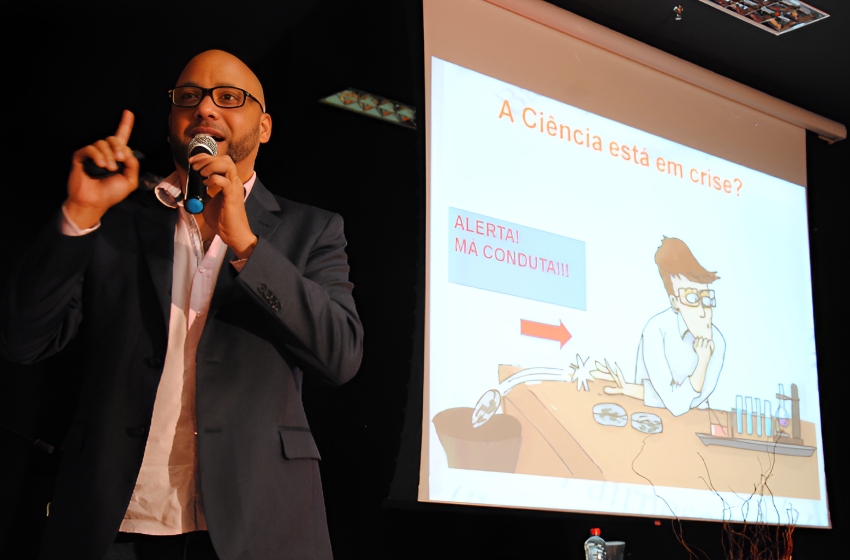Science is one of the most powerful tools humanity has to understand the world around us. Yet many people still have questions about how science really works and how scientists come to their conclusions.
Professor and Scientist Ulysses Albuquerque, Coordinator Recyclimawas interviewed on the show. Inter Din August 2023, was broadcast on Universitária FM in Recife. In this first part of the interview, he talks about biology, behavior, how science works and more.
In conversation with M LunaExplore the basic principles of the scientific method, the differences between hypotheses and theories, and the importance of critical thinking in developing an informed citizen. Here is a summary of the content.
The importance of the scientific method
The scientific method is a systematic and organized process that scientists use to gather information and interpret data. This approach allows them to reach informed and reliable conclusions. Let’s better understand how this process works.
### Stages of the scientific method
The scientific method generally follows a series of steps that include:
1. Observation
2. Formulating the question
3. Develop the hypothesis
4. Experiments to test the hypothesis
5. Data Analysis
6. Conclusion
Each of these steps is essential to ensure the accuracy and reliability of the results. A well-trained scientist knows that making a hasty statement can have dire consequences.
Hypotheses vs. Theories
One common confusion that many people have is the difference between hypotheses and theories. It is important to understand that these terms have different meanings in science.
### What is the hypothesis?
A hypothesis is a preliminary assumption that a scientist makes about a phenomenon. It is a testable statement that can be confirmed or disproved through experiments. For example, if a scientist suspects that a plant has medicinal properties, he or she will develop a hypothesis to test this idea.
### What is the theory?
On the other hand, a theory is a well-founded set of concepts that have been extensively tested and validated. For example, the theory of evolution is a robust explanation based on a broad body of evidence. Theories are not just guesses; they represent the best knowledge we have about a particular phenomenon.
The importance of critical thinking
Critical thinking is a fundamental skill that must be developed from an early age in education. It is not just about teaching science, it is about developing the ability to think critically about information and evidence.
### Developing critical thinking
Critical thinking allows people to analyze information more effectively and make informed choices. Ways to develop this skill include:
* arouse curiosity
* Encourage questions
* Promote open discussions
* Analysis of different points of view
These elements help build a solid foundation for individuals to become lifelong critical thinkers.
The role of ethics in science
Ethics are a vital component of scientific practice. During the pandemic, for example, there have been many instances of misinformation and unethical practices that have harmed public health. It is essential that scientists act responsibly and with integrity.
### Ethical Challenges in Science
Ethical challenges facing scientists include:
* Disclosure of accurate information
* Data processing
* Press for fast results.
* Conflict of interest
These factors can threaten the credibility of science and public trust.
Folklore and Mythology
Understanding how science works also involves demystifying some common beliefs. Scientific concepts are often misinterpreted or misused.
### Demystifying the Theory of Evolution
A clear example is the theory of evolution. Many people see it as just a hypothesis, when in fact it is a powerful theory that underlies many advances in medicine and biology.
Scientific discoveries, such as bacterial resistance, are directly linked to the principles of evolution. To deny this theory is to reject a wide range of knowledge that affects our daily lives.
The challenge of misinformation
In a world saturated with information, misinformation has become a major challenge. While social media is a powerful tool, it can also spread false information quickly.
### How to deal with misinformation
Some strategies to combat misinformation include:
* Verify information sources
* Expert advice
* Develop critical analysis skills
* Promote informed discussions
These actions help create a more informed and critical society.
Conclusion
Understanding how science works is essential to developing critical and informed citizens. The scientific method, the distinction between hypotheses and theories, and the importance of critical thinking are pillars that support this understanding. Ethics in science and combating misinformation are challenges we all must confront. By promoting critical thinking and science education, we can build a more informed and responsible future.
Listen to the full interview:
Also reach
Ulysses Albuquerque, scientist and professor at UFPE, launches e-book on doubt, pseudo-skepticism and science
Theory vs Hypothesis: Understanding the Difference
Brazilian Academy of Sciences says universities and researchers need to get more involved in combating misinformation

“Hardcore beer fanatic. Falls down a lot. Professional coffee fan. Music ninja.”






More Stories
The law allows children and adolescents to visit parents in the hospital.
Scientists pave the way for the emergence of a new element in the periodic table | World and Science
Can dengue cause hair loss? Expert explains how the disease affects hair